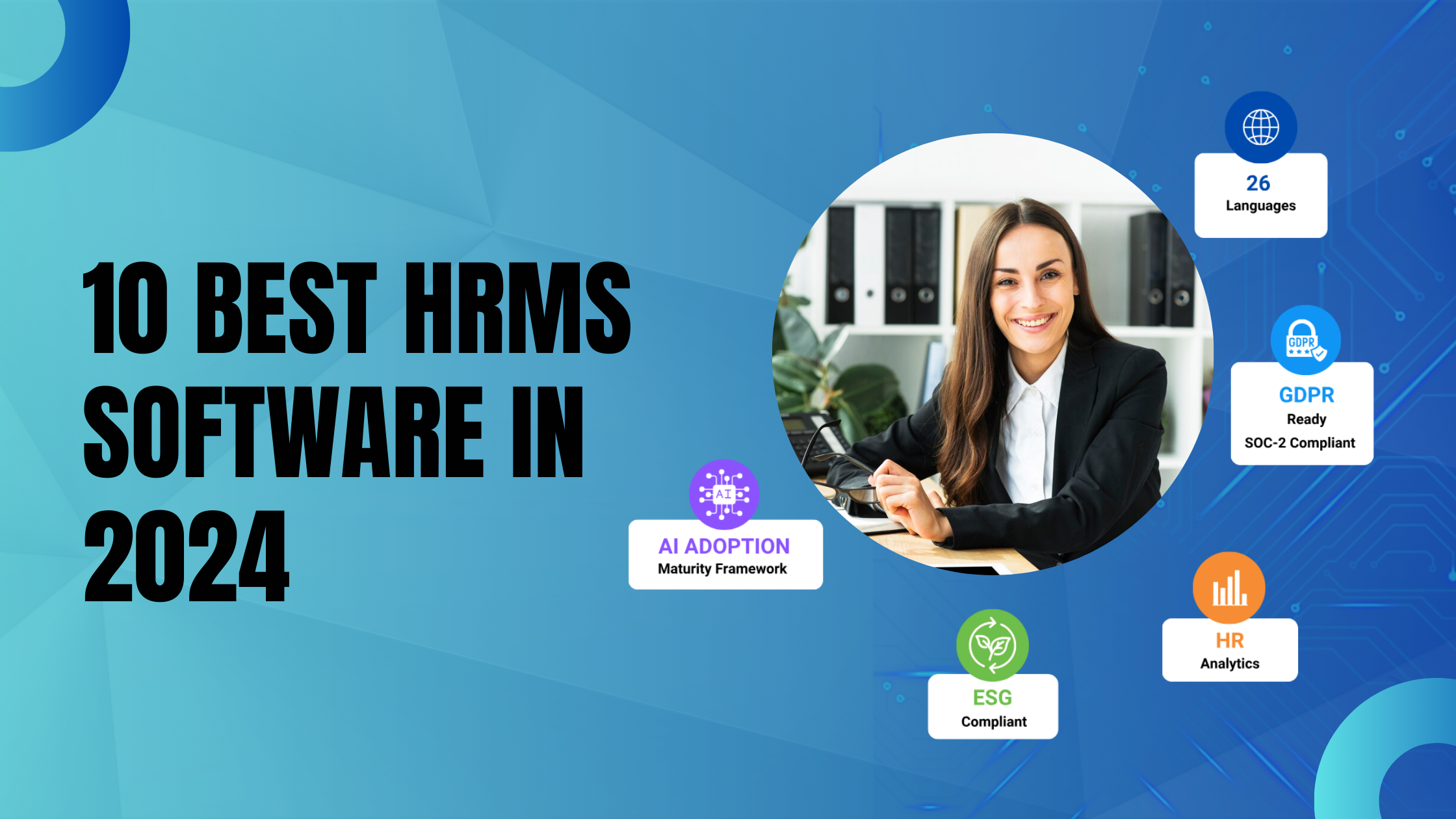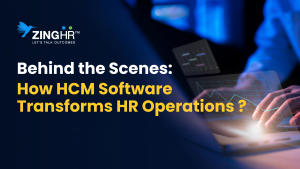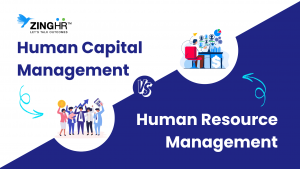Imagine managing a workforce of 500+ employees using a manual outdated process such as paper attendance, manual payroll process and dealing with lots of errors in employee performance data.
This situation is a reality for many organizations that have yet to implement HR software. According to surveys, organizations that use manual HR processes spend approximately 25% more time on administrative work and are more likely to make expensive errors.
As businesses grow and adapt to new issues such as remote work, hybrid teams, and complicated compliance requirements, the need for automated HR software becomes more vital. According to a Fortune Business Insights survey, the HR software industry is expected to grow to USD 33.57 billion by 2028, showing rising demand for products that streamline HR activities.
HR professionals manage a wide range of essential tasks every month, including recruiting and onboarding new employees, tracking their performance, and ensuring timely payroll disbursement. Performing these tasks manually without any automation process can significantly impact organizational efficiency and productivity.
So what is the solution?
The answer lies in HRMS software systems!
HR Software can help organizations save time, reduce costs, minimize errors and automate all HR processes. It enables HR professionals to streamline operations, leading to enhanced efficiency and overall productivity within the organization.
To help you make an informed decision, we’ve rounded up the Top 10 HR software in India, each offering unique features to streamline your HR processes.
What is an HR Software?
Human resources (HR) software is a digital tool that helps HR professionals manage their workforce hire to rehire lifecycle. HR Software can help variety of tasks, including:
- Applicant tracking systems (ATS): Automates the hiring process from sourcing candidates to onboarding new employees.
- Human capital management (HCM): Helps HR to track employee performance and growth and allows managers to set goals
- Human resource information systems (HRIS): Core HR processes like payroll processing and time and attendance management
- Human resource management systems (HRMS): Overarching software solution that includes an HRIS plus more advanced functionality for talent management
The core modules of an ideal HRMS software solution include time and attendance management, recruiting, onboarding and training, performance analysis, and payroll and benefits administration. The automation workflows and team collaboration tools embedded in it not only enhance the efficiency of HR functions but also increase the overall productivity of the workforce. Moreover, the best HRMS software systems for companies and large enterprises improve communication between employees, managers, and other stakeholders in the business. Last but not least, they also reduce data errors thanks to their robust analytics capabilities, tracking all information in real time.
List of Top 10 HR Software in India
Without further ado, let’s see which are the Top 10 HR software that can help you unlock HR excellence for your business in 2025:
1. ZingHR
Best all-in-one HCM software for mobile-first and employee-centric workforce management
G2 Rating: 4.1 / 5 ⭐
ZingHR comes under the Top 10 HR Software in India, offering advanced comprehensive cloud-based, mobile-first, employee-centric, Hire-to-rehire human resource and capital management platform. It provides robust solutions for multiple core HR functions, from onboarding to performance tracking, payroll administration, and exit management. ZingHR is an ideal choice for business organizations of all sizes and has had a sizable impact on streamlining HR operations, boosting workforce productivity, and driving business outcomes. It offers 35 HR modules in 26+ languages and boasts more than 2 million happy users worldwide.
Key Features:
- HR Ground Zero: Provides the foundation for streamlining core HR functions from organizational setup to standard analytics and report creation. Solutions include employee dossiers for recruitment data storage, organogram for visualizing resource allocation, intranet portal for communication, and robust HR analytics and standardized reports.
- Talent Acquisition: Offers a digital, mobile-first, and personalized experience to the HR and new hires and establishes a structured onboarding process with functions such as manpower budgeting and planning, multi-mode recruitment, robotic video interviews, and AI/ML screening.
- Employee Engagement: With the Zing Social Platform, you can engage employees with events beyond work, discover collaborative networks, build alignment for employee retention, and even survey the workforce for sentiment analysis.
- Talent Management: This feature includes functions like goal setting, the bell curve performance appraisal system, 360-degree feedback, and more.
- Workforce Management: To enhance workforce productivity, you have functions such as zero-touch payroll, employee shift scheduling, attendance and leave management, and facial recognition for accurate time clocking.
Pricing: Custom pricing based on the number of users and modules.
Why Choose ZingHR?
Suppose you are an enterprise-scale organization looking to scale its end-to-end HR operations and boost the productivity of your sizable workforce. In that case, ZingHR is the perfect solution for you. This software has been designed to cater to the needs of a wide range of industries, including BFSI, IT, manufacturing, retail, and healthcare, and it adapts flexibly to provide customized top-notch solutions based on your unique business needs. Moreover, as a cloud-based HRMS system, it ensures greater information security, maintains centralized and highly accessible documentation, and seamlessly integrates with relevant third-party software for the smooth functioning of core HR processes.
Here are the Two Successful ZingHR’s Case Studies
| Case Study | Healthcare Domain | Financial Service Domain |
|---|---|---|
| About the Customer | The hospital is famous as a super-speciality hospital with its cutting-edge facilities and pioneering medical technologies. They have approximately 600 employees, including doctors, nurses, and retainers, etc. | A prominent financial services provider with a large workforce of 42,000 employees. |
| Challenges | Transitioning from education to the healthcare industry. This shift required a significant overhaul of HR practices to meet industry-specific demands. The client needed a comprehensive HR solution that would automate their operations. | The company faced several issues with their manual attendance tracking, including inconsistencies and inaccuracies in data. The lack of real-time visibility and the challenge of managing attendance for a large sales team resulted in financial losses and operational inefficiencies. |
| ZingHR Solution | With 17+ years of domain expertise, ZingHR emerged as the ideal partner to support Aakash Healthcare’s HR transformation. We provided an advanced HCM solution with flexible Time, Leave, and Attendance management, ensuring seamless integration with existing payroll systems. | ZingHR introduced geo-fencing and IP address-based punch-in/out solutions which automate attendance tracking for all 42,000 employees. This solution ensured real-time accurate data and effective tracking and delivered 100% improvement in attendance management. |
| Read Full Case Study | Read more | Read more |
ZingHR User Testimonials and Reviews



2. Darwinbox
Best mobile-first HRMS software with digital onboarding and a face recognition attendance system
Darwinbox was founded to create a scalable HR solution that is adapted to the demands of developing businesses. The firm has quickly gained prominence as one of Asia’s top HR Software platforms, providing solutions that improve employee experiences. Darwin intends to digitise the whole employee lifecycle, helping organisations in developing a more flexible and adaptable workforce.
Its objective is to provide organisations with a cloud-based solution that incorporates the most recent technological breakthroughs and allows businesses to make more informed HR choices.
Key Features:
- End-to-end employee lifecycle management
- Advanced recruitment and onboarding tools
- Mobile-based attendance tracking
- AI-enabled HR analytics and insights
- Performance appraisal with 360-degree feedback
- Employee engagement through surveys and feedback
- Payroll and benefits management
- Integration with third-party applications
- Employee learning and development platform
- Customizable HR workflows
Pros:
- Employee self-portal to check for PTO and attendance verification
- Intuitive and user-friendly interface
Cons:
- Payroll modules can be improved
Pricing: Custom pricing based on the number of users and modules.
3. Rippling
Best online HR software for integrating HR, IT, and finance functions to create a single data source of truth
Rippling is a US-based startup that combines HR and IT management for all sizes of businesses. Rippling, founded to simplify administration work, enables organisations to handle everything from payroll to device Management via a single platform.
The company’s objective is to automate administrative duties and a productive work environment. Rippling has quickly become a popular option for organisations looking to optimise their HR and IT operations, by saving time and reducing mistakes.
Key Features:
- Unified HR and IT management
- Automatic payroll processing and tax filings
- Integration with over 500 apps
- Time tracking and attendance management
- Device and software provisioning for employees
- Customizable workflows and approval chains
- Multi-state and global payroll support
- Benefits management, including health, dental, and 401(k)
- Robust compliance management
- Role-based access control and permissions
Pros:
- Comes with a real-time headcount planning tool
- Clearly indicates benefits and insurance plans
Cons:
- Two-factor authentication can be improved with face or fingerprint scanning
Pricing: Starts at $8 (approx. ₹670) per user per month.
4. Oracle Cloud HCM
Best HR software provides structured and comprehensive access to enterprise HR intelligence data
Oracle HCM is part of Oracle Corporation, a global leader in corporate software and cloud computing. Oracle’s Human Capital Management (HCM) suite is designed to help large organisations manage their employees on a global level, and they are building on a long history of offering innovative business solutions.
The ambition of Oracle is to provide a single platform that uses AI and machine learning to improve workforce management. The Company’s objective is to help organisations make data-driven decisions that improve employee performance and organisational success.
Key Features:
- AI-driven workforce planning
- Global HR compliance management
- Comprehensive talent acquisition tools
- Integrated payroll and compensation management
- Workforce and succession planning
- Performance management with real-time feedback
- Advanced workforce analytics and reporting
- Mobile-responsive interface for employees and managers
- Social collaboration tools
- Integration with Oracle’s ERP and other enterprise systems
Pros:
- Robust approval flows and self-service options available
- Seamless integration between different HR modules
Cons:
- Comes with a steep learning curve
Pricing: Custom pricing based on the number of users and modules.
5. Deel
Best HRMS software solution providing global employer-of-record (EOR) services and compliance management
Deel is a global HR tech firm that simplifies payroll and compliance for remote employees. Deel’s objective is to enable businesses to manage worldwide teams while remaining compliant with local labour rules. Founded by entrepreneurs with a passion for global employment, Deel has quickly extended its services to support businesses in hiring, paying, and managing people across the world.
Key Features:
- Global payroll and contractor management
- Automated tax compliance across multiple countries
- Multi-currency payroll options
- Employee onboarding with custom contracts
- Global benefits management
- Contractor self-service portal
- Localized legal and compliance support
- Expense management for global teams
- Automated invoicing and payments
- Customizable workflows for remote teams
Pros:
- Automated invoices and payments in different currencies
- Provides detailed breakdowns of salaries and tax deductions
Cons:
- It does not offer a mobile app
Pricing: Starts at $49 (approx. ₹4,100) per worker per month for full-time employees.
6. KekaHR
Best HRMS software for creating a high employee performance culture
KekaHR also comes under the Top 10 Software in India, that aims to simplify and automate HR operations for organisations of all sizes. KekaHR, founded to create employee-centric solutions, seeks to allow organisations to focus on people rather than paperwork.
Their mission is to use technology to promote employee engagement and streamline HR processes, hence simplifying and improving HR management. With a growing customer base, KekaHR continues to improve its platform to satisfy the changing demands of modern organisations.
Key Features:
- Payroll processing with statutory compliance
- Employee performance tracking with OKRs and KPIs
- Leave and attendance management
- Employee engagement with pulse surveys
- Recruitment automation with candidate tracking
- Employee lifecycle management from onboarding to exit
- Mobile app for self-service HR functions
- Expense and reimbursement management
- Customizable reports and analytics
- Shift and workforce scheduling tools
Pros:
- Employee work hours are synced directly to payroll for accurate calculations
- Helpdesk features to cater to all employees from a centralized hub
Cons:
- No file management system with shared access within the company
Pricing: Starts at ₹6,999 per month for up to 100 employees.
7. SAP SuccessFactors
Best HRMS software for unifying employee experience and business workflows for international companies worldwide
SAP SuccessFactors is a global leader in human resources software they provide cloud-based solutions as part of SAP’s enterprise suite. SAP SuccessFactors was founded on the premise of giving organisations with tools to maximise their workforce potential, and it aims to help enterprises match business strategy with employee performance.
With a long history as a member of the SAP ecosystem, the company aims to provide innovative human capital management solutions that enable digital transformation, helping all sizes of organisations achieve operational excellence and sustainable growth.
Key Features:
- Global HR data management
- Talent acquisition with advanced sourcing tools
- Learning management system (LMS)
- Goal setting and performance management
- Compensation and payroll integration
- Succession planning and workforce development
- Employee engagement and survey tools
- Workforce analytics with AI-powered insights
- Mobile accessibility for HR functions
- Integration with SAP ERP and other enterprise solutions
Pros:
- Enables easy tracking of progress in business processes
- Integration with SAP ERP that streamlines HR and finance workflows
Cons:
- Customization options for certain aspects, such as profile data, can be improved
Pricing: Starts at around $6.35 (approx. ₹530) per user per month.
8. Paychex
Best for providing compliance support to mid-size and enterprise companies
Paychex headquartered in the United States, and it is leading payroll, human resources, and outsourcing services to small, and medium-sized enterprises. Paychex was founded with the goal of simplifying payroll management, but it has since grown to offer a full spectrum of HR solutions. The objective of the company is to help businesses focus on growth by efficiently handling their payroll and human resource demands. With decades of market expertise, Paychex is always evolving its services to meet the contemporary expectations of businesses in a variety of industries.
Key Features:
- Automatic payroll and tax filing
- HR compliance support with industry regulations
- Employee benefits administration
- Time and attendance tracking
- Hiring and onboarding tools
- Integrated employee retirement plans (401(k))
- Employee self-service portal
- Mobile app for payroll and HR functions
- Custom reports and data analytics
- Integration with accounting and ERP software
Pros:
- Payroll reports can be customized and generated in minutes
- Easy access through a mobile app for both managers and employees
Cons:
- Changing employees to different departments can be made easier
Pricing: Starts at $39 (approx. ₹3,250) per month, plus $5 (approx. ₹410) per employee.
9. Sage HR
Best adaptive HRMS software with a native mobile app for expense management
Sage HR is an easy-to-setup and use HRMS platform for small to medium-sized businesses. It simplifies and automates every step of the HR process while helping the company engage its employees.
Key features:
- Customizable employee profiles
- Leave management with automated approvals
- Performance reviews with goal tracking
- Applicant tracking and recruitment management
- Timesheets and expense management
- Employee onboarding and document management
- Workforce analytics and reporting tools
- Employee engagement through surveys and feedback
- Task management and project tracking
- Mobile app for on-the-go HR functions
Pros:
- Review process functionality is super easy to use
- Seamless compensation and timecard management
Cons:
- Data syncing can be improved across the whole system
Pricing: Starts at $5.50 (approx. ₹460) per employee per month.
10. PeopleHR
Best for small, medium, and scaling enterprises seeking added functionalities to elevate the employee experience
PeopleHR is a UK-based HR software firm dedicated to providing innovative solutions that ease HR administration. PeopleHR was founded to help organisations automate time-consuming HR procedures, and its mission is to build software that places people at the centre of every business decision.
The firm focuses on creating simple solutions that help organisations streamline everything from recruiting to performance management, all while prioritising employee engagement and pleasure. PeopleHR is committed to constantly improving its platform to meet the changing demands of HR professionals.
Key Features:
- Cloud-based employee database management
- Automated recruitment and applicant tracking system
- Performance review tools with 360-degree feedback
- Holiday and leave management
- Workforce analytics and insights
- Employee self-service portal
- Document storage and compliance management
- Learning and development tracking
- Payroll integration with third-party providers
- Mobile-friendly interface for all HR functions
Pros:
- Comes with robust and accurate reporting capabilities
- Built-in annual leave planner for employee leave scheduling
Cons:
- The org chart is not very user-friendly
Pricing: Starts at £4 (approx. ₹400) per employee per month.
Criteria for Selecting the Right HR Software
Here is a checklist to help you choose the right HR software. You should evaluate key criteria to make sure it meets your organization’s needs.
First and foremost important that is…
1. Features
When choosing HR software, focus on the key features your organization needs. This will help meet your HR requirements. Assessing features ensures the software offers full support, easy integration, essential tools, and, most importantly, a good user experience.
- Core HR Functions: Ensure the software includes essential HR features such as payroll, admin benefits, a self-service portal, compensation, etc.
- Recruitment and Onboarding: Look for the tool that streamlines your recruitment processes including job posting, resume screening, ATS (Applicant Tracking System), and onboarding. So, You can automate tasks and you can focus on the rest of the work.
- Performance Management: Through the PMS module, you can create goal setting, KRA, KPI, OKRS, performance reviews, continuous feedback, 360 feedback and performance analytics and analysis.
- Reporting and Analytics: If the software has Robust reporting capabilities then you can track key HR metrics such as turnover rates, employee satisfaction, and compliance. Look for software that offers customizable dashboards and detailed reports.
The second thing you should go for…User Interface and User Experience.
2. Ease of Use
- User Interface: A clean and intuitive interface can significantly impact how easily your team can navigate the software. User-friendly design reduces the learning curve.
- Integration Capabilities: Check HR System can integrate 3rd-party or in-house solutions such as CRM Tools and productivity apps.
3. Scalability
- Growth Adaptability: Choose software that saves your time and automates all the HR processes easily. So you can scale with your business as it grows
- Customizability: Customization in HR software means changing the software to meet your needs. This gives you flexibility and a personal touch.
4. Customer Support
- 24/7 Support: Customer support is essential for resolving tech issues. Check for support options such as live chat, phone, and email.
- User Reviews: Before buying software research the user reviews and testimonials to gauge the quality of customer support. Positive feedback and problem resolution can indicate a good and reliable support system.
5. Cost and Value
- Pricing Structure: Check out the pricing Structure that fits within your budget. Consider factors such as subscription costs, implementation fees, and any additional charges for upgrades or add-ons.
- ROI: Evaluate the potential ROI by evaluating how the software can automate HR processes, reduce administrative costs, and improve overall efficiency.
Now Let’s Move Forward Following a Detailed Research and Assessment List of HRMS Software
What To Look For in an Ideal HRMS Software?
Choosing the right HRMS software solution for your enterprise can be challenging, which is why you should take a look at these key attributes you must keep in mind while making your selection:
# Employee Data Storage and Integration
To electronically store employee data, including personal information, job history, and contact information, with updates synced across all integrated HR modules.
# Recruitment, Onboarding, and Performance Management
To automate hiring and onboarding activities, like posting jobs, tracking applicants, and scheduling interviews. Additionally, it should also monitor employee performance and automate the workflows for reviews and appraisals.
# Time and Attendance Management
To track employee hours and attendance and manage time-off requests (both paid and unpaid), accruals, and balances.
# Employee Self-Service Options
To enable users to verify and update data by themselves. Employees can use it to update their timesheets, for instance, while managers can utilize it to assign shifts and approve timecards.
# Payroll Processing
To automate payroll calculations by taking time and attendance data into account and enabling timely disbursal of compensation to all employees.
# Analytics and Reporting
To run advanced analysis on employee data across the different modules and provide valuable insights into workforce trends, employee churn rates, and other key HR metrics.
You may also check out what functions HRMS software systems should support in a large-scale enterprise.
Based on the information charted above, we can clearly see that ZingHR is the winner. This software not only empowers your business with the run-of-the-mill core HR operations, such as employee, payroll, performance, attendance, and talent management, but also supports underrated HR functions, such as learning and development, succession planning, and employee exit management, that future-proof your organization in today’s dynamic corporate landscape. This makes it the perfect choice for workforce planning and management and driving informed decision-making for positive outcomes in businesses of all sizes.
Digitize Your Core HR Functions To Improve Workforce Efficiency with ZingHR!
Every modern workforce, irrespective of the organisation’s size, needs a capable human resource management system (HRMS) product. I hope the list of options above helps you make the right choice of software for your company. While all the HRMS tools in this list offer comprehensive HR solutions, we would like to recommend ZingHR as your go-to option. It supports organizations of every size with a full suite of traditional and modern HR functions, augmented with cutting-edge technology, smart automation, and data-driven insights, increasing business efficiency and driving informed decision-making for growth and development.
FAQs
1. How can HR Software Benefit my Business?
An HRMS software benefits your business by automating HR operations, increasing accuracy, and providing self-service options to employees, leading to an effective use of organizational resources. Also, It ensures compliance, streamlines workflows, monitors time and attendance, helps with recruitment and onboarding, and tracks employee performance. Combined with its data integration capabilities, this fosters scalability, interoperability, mobile accessibility, and employee engagement, which in turn, results in saving your business time and money.
2. Can HRMS Software be Customized to suit the Unique Needs of my Organization?
Yes, you can customize your chosen HRMS product to support your business in whichever way you want. Even using the same HRMS, two different companies in separate industries can employ their functionalities in different ways. An HRMS software typically allows users to select different features they want to include in their package and price different packages accordingly.
3. What is the Cost of an HRMS tool?
The cost of an HRMS tool depends on several factors, such as key features, user count, customizability, vendor pricing, and much more. Pricing can be subscription-based, which typically is the case for cloud-based HRMS software. The costs are less upfront; however, you need a steady internet connection. It is well-suited for SMBs and SMEs. On-premises HRMS software, on the other hand, can be expensive to install but are much more customizable, and you only need to spend on it once. It is better suited to large enterprises.
4. What are the Key Features of HR Software?
Here are some key HRMS software features:
- Centralizing employee data on an integrated platform
- Monitoring employee work hours and attendance
- Tracking recruitment, onboarding, and training of new hires
- Automating payroll calculations and tax deductions
- Enabling employees to access their data through self-service
… and much more.




